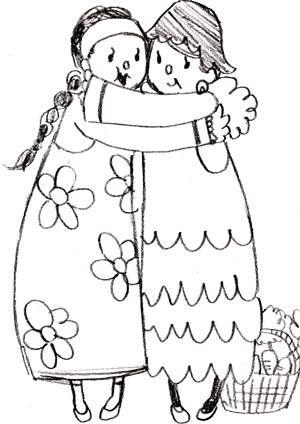The geek answer (bad faith or blindness): “If only everyone learned to code, then society would be fairer.”
The activist answer: Code is part of the landscape, but culture, governance, and lived practice matter more. We don’t escape domination by teaching more people to type commands, we escape by changing what we do together with the tools.
Why “teach everyone to code” has become a dead-end slogan – it’s been tried, it’s been funded, and yet it hasn’t shifted power one bit. If anything, it’s reinforced the tech priesthood instead of breaking it.
The #geekproblem is exactly this blindness: geeks mistake tools for culture, skill for power, and training for change. They can’t see that the last 20 years of “learn to code” projects have failed precisely because they sidestep politics, trust, and social fabric. It’s comfortable, because it keeps power where it already is.
So, coding literacy might be useful, but it’s not transformative without social literacy – trust, collective governance, open processes. The real activist social tech path is to compost geek mess-making and build alt-cultures where tools serve the collective, not the priesthood.
Otherwise, “coding for all” is another flavour of #blocking – keeping us stuck, distracted, and blind. This is a useful example of the blinded #geekproblem. I use the word blinded to illustrate that people can’t see the sense in front of their faces. And I use the hashtag #blocking to show the outcome of this common “sense” blindness #KISS

Coding is not automatically social power, but in some contexts it does act as power, and understanding when/why helps unpack the #geekproblem.
- When coding is not power
Most coding done in industry is low-level labour: writing scripts, fixing bugs, maintaining old systems. These programmers aren’t powerful; they’re workers. Their code serves capital.
Teaching kids to code (“everyone can make an app!”) rarely translates to actual power, because the infrastructure, distribution, and governance of platforms remain controlled by corporations.
Coding on its own doesn’t equal voice. A line of code in a corporate repo is no more socially powerful than a line in a personal diary if the person coding has no agency over how it’s used.
- When coding is power
Coding becomes power when it bridges infrastructure + governance + culture.
Building #openweb infrastructure: If you can write the protocols or standards (e.g. ActivityPub, TCP/IP), you shape the possibilities for everyone downstream. That’s a kind of structural power.
Gatekeeping: If you control the codebase of a popular project, you can decide what features exist, whose contributions get merged, and which voices are excluded. This is soft but real power.
Automation and scale: Writing code that automates tasks (e.g. bots, algorithms, moderation tools) gives leverage over many people’s experience, especially when hidden in the background.
Narrative + legitimacy: In activist or grassroots spaces, coders too often get treated as “high priests” because they appear to have magical abilities others lack. This cultural framing inflates their social weight.
- The Catch (where the #geekproblem lives)
Coders confuse technical power with social change. They think: “If I can write the tool, I can fix the politics.” But tools reflect cultures. Without collective governance, tools just reproduce existing hierarchies.
The illusion of inevitability: because software underpins modern life, geeks assume society must organize around them. That blindness is what we’re pointing to.
When geeks push “everyone must code” as the path, they miss that most people don’t need to code to have power, they need agency in decision-making and trust networks.
- How it really works (coding + social power)
Coding has power when embedded in movements that control their infrastructure. Example: early #Indymedia coders had real social power because their code directly enabled publishing outside corporate media – and at the start they were accountable to activist collectives.
Coding has power when it’s used to mediate flows of attention, trust, and resources. For example, algorithms that boost or bury voices. In grassroots hands, that can be liberatory; in corporate hands, it’s oppressive.
Coding becomes shared power when it is paired with open process (#4opens), shared governance (#OGB), and cultural literacy. Otherwise, it’s generally more priesthood, likely for the #deatcult in the end.
So: coding is like fire. On its own, it’s just heat and light. In the hands of a few, it’s a weapon or a fortress. In the commons, with shared tending, it’s the hearth – collective power.

To recap, coding as social power: Myth vs Reality
Myth 1: Coding = empowerment
We’ve been told that “if everyone learns to code, everyone will have power.” Twenty years of coding bootcamps, “learn to code” initiatives, and school programs prove otherwise. Most of this simply trains people to slot into corporate pipelines. The power stays where it always was.
Reality: Coding on its own is labour, not empowerment. The infrastructure, governance, and distribution layers decide where the power flows. Without culture and collective governance, coding is just fuel for someone else’s engine.
Myth 2: Coding makes you special
Coders often act like priests, holding secret knowledge. In activist spaces, this creates the illusion that coders alone can “save” or “lead.” That’s the #geekproblem in action.
Reality: Tools are only as powerful as the cultures and processes around them. A coder without collective accountability is just another gatekeeper. A coder inside a collective, with open governance (#4opens, #OGB), can help shift power outward.
Myth 3: Coding will fix politics
The geek fantasy: “If I build the right app, the politics will fix itself.” We’ve seen this with countless “alternative platforms” that end up reproducing the same hierarchies.
Reality: Politics is culture, trust, and process. Code can mediate, amplify, or automate, but it cannot replace politics. Tools without culture are empty shells; culture without tools is still possible.
The compost view is the task isn’t to make everyone a coder, but to compost the priesthood and grow cultures where coding is a part of the collective. That’s the #KISS answer: code can support social power, but it is not social power.

What to do to compost this #geekproblem mess:
- Build cultures, not just tools: Stop pretending apps fix politics. Tools only matter if they grow inside strong cultures. Put people first, tech second.
- Open the process (#4opens): Keep everything open: code, data, governance, strategy. Power hides in shadows; openness dissolves the priesthood. If it’s not open, it’s not our path.
- Practice collective governance (#OGB): It helps when decisions about infrastructure are made more horizontally. Coders are part of the collective, not above it. Shared governance turns coding from priesthood into common fire.
The path out of the #geekproblem is in composting geek blindness and building living cultures where coding is a part of growing the commons.

For an example, this post is relevant to the degeneration of the #SocialHub project, which for meany years was the place for #ActivityPub and #Fediverse #openweb reboot, but now what’s left of the social side is the few remaining active unthinking “problem” people.

This is a normal path and outcome, that we need to compost to keep growing seeds #KISS
2 thoughts on “Why “teach everyone to code” has become a dead-end slogan”